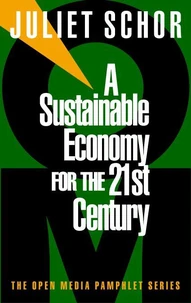Bestselling author, leading sociologist and economist Juliet Schor makes the case for a four-day work week, persuasively showing how this model can address major challenges such as burnout, AI and the climate crisis, and how employees, companies, and governments can work together to make it a reality. Around the world, long hours and intense pressure are taking their toll. When the pandemic hit in 2020, work-induced stress and burnout skyrocketed.
Many reached a breaking point. Now, three-quarters of the world's employees are disengaged and struggling, including in the US and Canada, where half are experiencing high levels of daily stress. Our current work culture, the five-day, forty-hours-a-week model-which has gone unchanged for nearly a century-is failing. But a remedial countertrend has emerged: the four-day work week. Kickstarter, Bolt, Basecamp, ThredUp, and hundreds of other employers have eliminated the fifth day of work, successfully figuring out how to maintain productivity while seeing remarkable improvements in employee well-being.
Hiring is easier and fewer people are quitting. These results are global. Working a four-day week, people feel energized, capable, and more optimistic about their lives-and their jobs. Four Days a Week is the first large-scale study of this trend. Juliet Schor-an expert who has researched and written about work for more than four decades, beginning with her New York Times bestseller The Overworked American in 1992-shares her pioneering analysis of the benefits of a shorter work week, how companies can achieve them, why the concept has taken so long to emerge and gain acceptance, and why doing so will help a company's employees and its bottom line.
The book is a blueprint for implementing a change that once seemed radical, but is now within reach.
Bestselling author, leading sociologist and economist Juliet Schor makes the case for a four-day work week, persuasively showing how this model can address major challenges such as burnout, AI and the climate crisis, and how employees, companies, and governments can work together to make it a reality. Around the world, long hours and intense pressure are taking their toll. When the pandemic hit in 2020, work-induced stress and burnout skyrocketed.
Many reached a breaking point. Now, three-quarters of the world's employees are disengaged and struggling, including in the US and Canada, where half are experiencing high levels of daily stress. Our current work culture, the five-day, forty-hours-a-week model-which has gone unchanged for nearly a century-is failing. But a remedial countertrend has emerged: the four-day work week. Kickstarter, Bolt, Basecamp, ThredUp, and hundreds of other employers have eliminated the fifth day of work, successfully figuring out how to maintain productivity while seeing remarkable improvements in employee well-being.
Hiring is easier and fewer people are quitting. These results are global. Working a four-day week, people feel energized, capable, and more optimistic about their lives-and their jobs. Four Days a Week is the first large-scale study of this trend. Juliet Schor-an expert who has researched and written about work for more than four decades, beginning with her New York Times bestseller The Overworked American in 1992-shares her pioneering analysis of the benefits of a shorter work week, how companies can achieve them, why the concept has taken so long to emerge and gain acceptance, and why doing so will help a company's employees and its bottom line.
The book is a blueprint for implementing a change that once seemed radical, but is now within reach.

 , qui est-ce ?
, qui est-ce ?